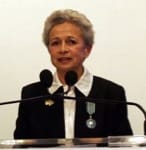The administration of a classical orchestra is an abstract task, and it is difficult to envision it due to the significant scope of such a cultural enterprise. Yet, a small woman endowed with great talents as a mediator, initiator, visionary, and entrepreneur in the literal sense has managed to give it a remarkable image.
Moreover, are there many women in command of such a large ship? Yet, for nearly 33 years, Catherine Morschel has been at the helm of this beautiful entity, the Regional Orchestra of Provence-Alpes-Côte d’Azur in Cannes. This did not happen by chance.
Catherine Morschel is the daughter of a conductor and a teacher. She spent her entire youth immersed in lyrical and symphonic music. These two influences governed her destiny. For her entire career has been animated by her love of the arts and her deep respect for the republican values, of which the notion of public service is, in her view, one of the main foundations.
It is not surprising that, from the age of 18, she wanted to direct her professional life towards a cultural career like her half-sister.
During her adolescence, Catherine quickly grasped the world of show business, discovering both its pleasures and constraints: she helped her parents in organizing and staging opera performances. She worked as a poster pasteur, stage manager, props assistant, and cashier; did a lot of extras work at the Nice Opera and learned much from this all-round apprenticeship.
She followed this with studies at the University of Nice, where she graduated with a Master’s degree in public law. She created a cultural union with some of her fellow students, aiming to organize artistic and cultural events on campus. She thus began to assert her taste for popular Culture, striving for quality accessible to the greatest number, as an heir to the great principles of one of her role models: André Malraux.
It was during this time, with her union, that she organized the arrival of painters from the School of Nice, with Ben displaying his works in the “Salle des Pas Perdus” of the Faculty of Law in Nice, as well as a series of lectures on art history, and the very young Regional Orchestra (it was 1975) came to give several concerts in the grand amphitheater.
In 1976, she applied for the position of press secretary for the regional orchestra but soon replaced the ailing administrator of the orchestra. Her energy and dynamism quickly propelled her to the official position as administrator. The orchestra had just been created, and the entire structure needed to be established and developed. From that moment, she worked alongside Philippe Bender, the musical and artistic director of the Orchestra, appointed shortly before.
At 25, she thus found herself at the head of a budget and a challenge: to maintain an orchestra that had very little money. Wasn’t her will already to implement her ideas on the public service of music: accessible to everyone across the region? It is to this extraordinary adventure that Catherine Morschel would devote herself passionately to this day.
Determined, able to adapt to the most delicate situations without selling her soul, this small woman has taken on a colossal task. Her creativity, rigor, tenacity, work capacity, and ability to listen have enabled her to develop her project: to make the orchestra a key institution.
To do this, Catherine Morschel delivered very specific work: establishing a complete network across the regional territory so that many towns and places could benefit from the “arrival of Music” without distinction of size, wealth, or political affiliation. It was necessary to “geographically anchor” the Orchestra and expand its funding: of course, from local governments, but also from the private sector by fostering openness to the business world.
Thus, in the 1980s, she initiated the creation of the Friends of the Orchestra Association, and in 1999 contributed largely to the foundation of ANDANTINO, a partnership club of corporate partners of the Orchestra.
Since its inception, the “Bender – Morschel” duo has always functioned wonderfully and also … at a hundred thousand volts. They have adapted to political changes, changes in audiences by inventing new forms to always reach out: concerts in prisons, in retirement homes, residences in challenging neighborhoods, initiatives for sick children and in hospitals, concerts for schools, children’s choir operas, … the list is still long of actions that make the Orchestra one of the most vibrant illustrations of what public service of Music is in its most republican conception.
Moreover, does Catherine Morschel not like to define herself as a daughter of the latter?


